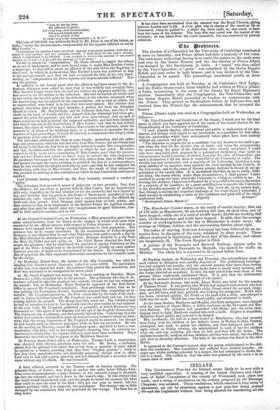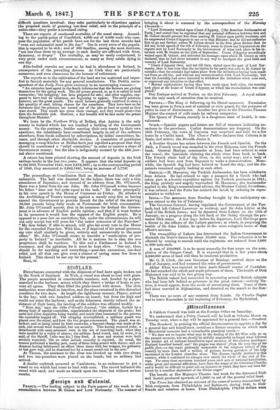IRELAND.
The Government Poor-law for Ireland seems likely to be met with a very modified opposition. A meeting of the Grand Jurymen and Chair- men of Relief Committees of the county of Westmeath took place last week; and a string of resolutions on the subject, proposed by Sir Montagu Chapman, was adopted. These resolutions, which received a long array of signatures, set out by protesting against a new poor-law being pressed through the Legislature without time being allowed for considering all the
difficult questions involved: they refer particularly to objections against the proposed mode of granting out-door relief, and to the principle of a onion-rats—they prefer a townland rating.
There are reports of continued mortality, of the usual stamp. Accord- ing to the parish-priest of Coachford, 4,000 out of 6,000 souls who com- pose the population of his parish have not for the last three months had " even one substantial meal in the day." One in every seven of the popula- tion is reported to be sick; and of 300 families, among the most destitute, "not less than three on an average in each family are afflicted with fever, dysentery, or dropsy." The mortality, as may be easily conjectured, is very great under such circumstances; so many as forty adults dying in one day.
Able-bodied recruits are now to be had in abundance in Ireland, in consequence of the prevailing distress. At Cork they are particularly numerous, and even clamorous for the honour of enlistment.
The reports as to the cultivation of the land are too scattered and imper- fect to furnish materials for any general conclusions. The Dublin corre- spondent of the Daily News gives currency to an encouraging rumour— "An extensive land-agent in the South informs me that the farmers are girding themselves for the spring work. The old potato ground, or, as it is called in local vernacular,' the redigging,' has been prepared for oats; and other supplies, sup- to have had no existence, are beginning to appear. The early potatoes, however, are the great puzzle. The small farmers generally contrived to store a fair quantity of seed, taking chance for the soundness. They have been so far fortunate that the potatoes are turned out of the pits at least as sound as they were stored. This result has given them courage, and they would plant—but then the formidable risk. However, a fair breadth will be laid under the potato throughout Munster."
We learn by the Northern Whig of Belfast, that Antrim is the only county in Ireland which has not touched a farthing of the Government money. On the contrary, besides meeting their own wants by their own exertions, the inhabitants have contributed largely in aid of the sufferers elsewhere, from funds collected by subscriptions, by ladies' committees, ba- zaars, and through other charitable devices. A committee of gentlemen managing, a soup-kitchen at Belfast have just signified a proposal that they should be constituted a " relief committee," in order to receive a share of Government money; but the idea is indignantly scouted by the able jour- nal above mentioned.
A return has been printed showing the amount of deposits in the Irish savings-banks in the last two years. It appears that the total deposits up to the 20th November 1845, were 2,876,3881.; up to the corresponding period of 1846, they amounted to 2,882,1661., being an increase of 5,7781.
The proceedings at Conciliation Hall on Monday had little of the old animation. The hall was deserted by the ladies; there was only a thin attendance of Repealers; and instead of an address from Mr. O'Connell, there was a letter from his son John. Mr. John O'Connell writes because his father " does not feel quite equal to the task." He refers principally to his own speech in the House of Commons on Friday. He alludes to the Archbishop of Tuam's warning against a merely soup diet as having caused the Government to provide biscuit for the relief of the starving; 58,000 pounds being daily made at Portsmouth for Irish consumption. Mr. John O'Connell asserts, that in its measures for Ireland the Govern- ment is in advance of English public opinion; and that if it went further in its measures it would lose the support of the English people. He is opposed to a poor-law on conviction; but, under the circumstances, he will not only accept but will press for "the entire extension of the Poor-law."
My dear father, if able to attend, will give his every vote in the House for the extended Poor-law. With him, or if deprived of his actual presence, my vote shall similarly be given, entirely and unreservedly to the same effect." Mr. John O'Connell seems to consider a " confiscation of pro- perty in Ireland " as inevitable. All he is anxious for is that the new proprietors shall be residents. To this end a Parliament in Ireland is necessary, and the agitation for it must be kept alive. " Our cry, then, should be for anything and everything,—poor-law extensions, out-door relief, and all that can give even a chance of saving some few lives in Ireland. This should be our cry for the present."
Rent, 61.



























 Previous page
Previous page